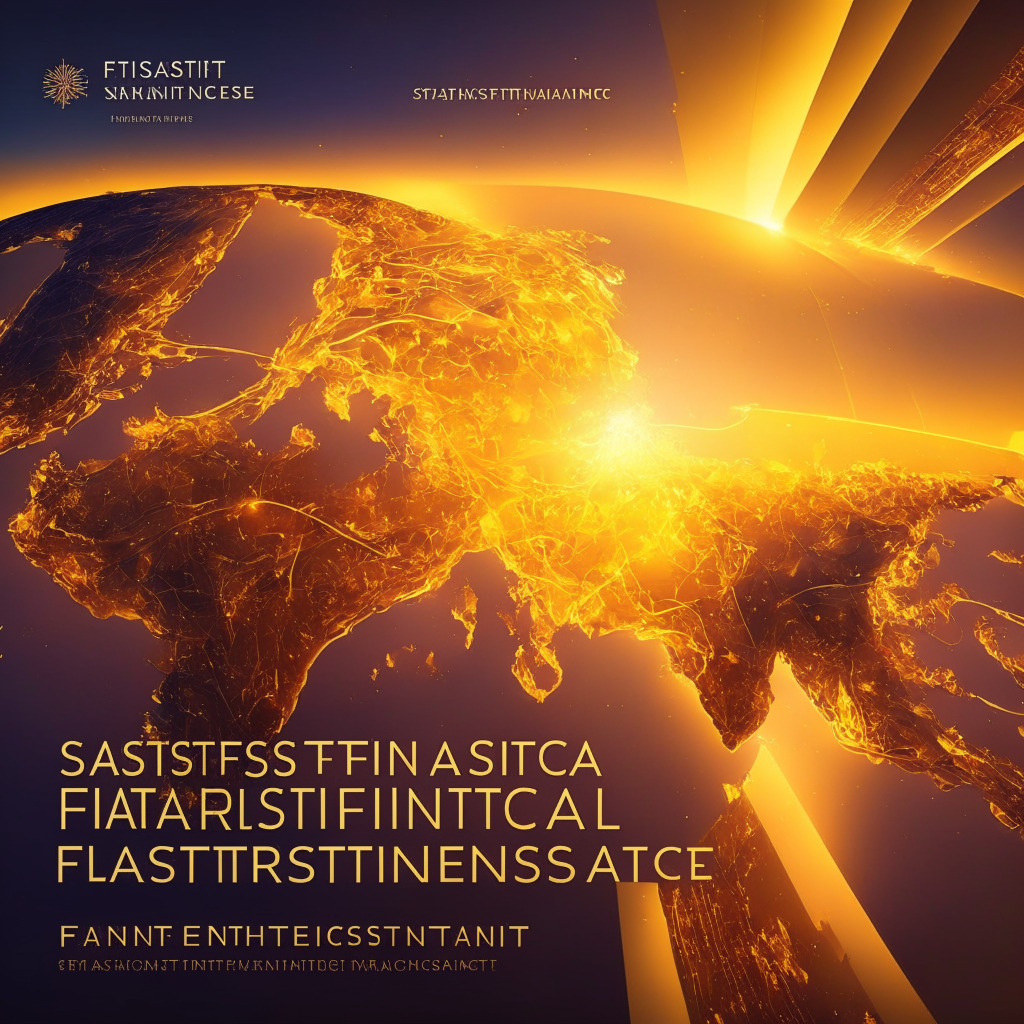The Monetary Authority of Singapore (MAS), in collaboration with the IMF and others, has proposed standards for using digital money on distributed ledgers, including central bank digital currencies (CBDCs) and tokenized bank deposits. The protocol addresses programmability, balancing innovation, and regulation to ensure digital money serves as a medium of exchange without compromising financial stability and user experience.
Search Results for: Monetary Authority of Singapore
Hong Kong’s Race to Rival Singapore: Embracing Crypto and Fintech Innovation vs. US Regulatory Crackdown
Hong Kong aims to become a leading crypto hub, rivaling Singapore, by encouraging major banks to embrace cryptocurrency exchanges as clients. The city has introduced a clear regulatory framework to promote innovation, attracting numerous crypto players to establish operations in the region.
Circle’s MPI License Win: Boost for Singapore’s Crypto Market & Future Challenges
Circle Internet Singapore has been granted a Major Payment Institution license by the Monetary Authority of Singapore, allowing them to offer digital payment token services and money transfer services. This highlights Singapore’s dedication to fostering a supportive environment for blockchain and cryptocurrency technology.
Singapore MPI License for Circle: Stablecoin Progress or Restrictive Regulations?
Circle Singapore, an affiliate of Circle Internet Financial, received a Major Payment Institution (MPI) license from the Monetary Authority of Singapore (MAS). This allows them to offer digital payment token services, cross-border and domestic money transfers within Singapore. The move signifies regulatory progress in the cryptocurrency and blockchain industries, but proposed restrictions on stablecoin activities like lending and staking raise concerns.
Crypto.com Gains Major Payment License in Singapore: Analyzing Pros and Cons for the Market
Singapore-based cryptocurrency exchange, Crypto.com, has been granted a Major Payment Institution (MPI) license for Digital Payment Token (DPT) services by the Monetary Authority of Singapore (MAS). This achievement bolsters its credibility and demonstrates the maturing nature of the crypto market, promoting market stability and growth.
Coinbase Expands in Singapore Amid US Regulatory Uncertainty: Pros, Cons, and Challenges
Coinbase is expanding its global presence, focusing on Singapore amid the SEC’s hesitance on crypto regulations. Launching the Coinbase International Exchange in the Bahamas, Coinbase has introduced various products for Singapore customers, with 25% of Singaporeans seeing crypto as the future of finance.
Collapse of Three Arrows Capital: A Cautionary Tale in Crypto Regulation Compliance
The collapse of Three Arrows Capital due to Luna and TerraUSD’s slump has affected Singapore’s financial markets. The Monetary Authority of Singapore has barred founders Zhu Su and Kyle Davies for nine years, citing regulatory infringements and lack of transparency. This highlights the importance of regulatory compliance in the volatile cryptocurrency industry.
Regulatory Dilemma in Crypto Finance: Safety or Innovation?
The Monetary Authority of Singapore (MAS) imposed a nine-year prohibition on Three Arrows Capital (3AC) founders for violating Singapore’s securities laws. They failed to disclose new business representative induction and risk management inadequacies. This illustrates the importance of transparency and strong structures in crypto finance.
Southeast Asian Super App Grab Launches Blockchain Wallet and NFT Vouchers: A Brave Step or Casual Ripple?
Southeast Asian super app Grab, in collaboration with the Monetary Authority of Singapore (MAS), is venturing into the realm of blockchain technology and non-fungible tokens (NFTs). They have unveiled a unique Polygon-based Web3 wallet and NFT vouchers, which serve as digital collectibles and can be used for various services across Singapore. While the project holds promise, questions about its feasibility and the security of these digital assets persist.
New Regulatory Landscape for Stablecoins: Balancing Investor Protection with Innovation
The Monetary Authority of Singapore (MAS) has unveiled a regulatory framework for stablecoins, providing guidelines for issuers on value stability, capital, and redemption. This move, which could bring security while potentially stifling small-scale startups, reflects a global trend in digital currency regulation.
Emergence of Regulated Crypto Exchanges: Boon or Bane for the Crypto Industry?
“Blockchain.com has been granted a major payment institution license by the Monetary Authority of Singapore, permitting it to offer regulated digital payment token services to international clients. This reflects Singapore’s ongoing support for crypto companies, contributing to discussions about the impact of increasing regulatory controls on crypto’s foundational values and innovation.”
Exploring Project Guardian: Tokenized Digital Assets and the Future of Finance
The Monetary Authority of Singapore, Bank for International Settlements, and major financial institutions collaborate on Project Guardian, which explores designing open and interoperable networks for tokenized digital assets across asset classes like wealth management, fixed income, and foreign exchange. This project raises questions on accessibility, scalability, and regulatory adaptation.
XRP Bulls Eye $0.76 Breakout: Pros, Cons, and Market Battles Amid Ripple’s Global Expansion
XRP bulls show enthusiasm with a 6.6% weekly growth, as Ripple gains in-principle approval for a Major Payments Institution License from the Monetary Authority of Singapore. The approval expands customer utilization of Ripple’s crypto-facilitated On-Demand Liquidity (ODL) service.
The Future of Purpose-Bound Money: Pros, Cons, and Interoperability Challenges
The Monetary Authority of Singapore is researching central bank digital currencies (CBDCs) and their use cases. A recent white paper explores the potential of purpose-bound money (PBM) and its components: a wrapper and a store of value. PBMs offer privacy and enable both public and private sectors to utilize digital currencies, highlighting the increasing potential and demand for digital currency options.
Embracing Purpose Bound Money: Revolutionizing Finance or Inviting Scrutiny?
Singapore proposes a common standard for digital currencies, including stablecoins, tokenized bank deposits, and CBDCs, with contributions from major banks, investors, and global leaders. The Monetary Authority of Singapore’s whitepaper on Purpose Bound Money (PBM) aims to revolutionize the financial landscape by allowing senders to specify conditions and improving settlement efficiency, merchant acquisition, and user experience. However, increased regulatory scrutiny is a challenge to be considered in this rapidly growing digital financial landscape.
Crypto Regulation Showdown: Balancing Innovation & Investor Protection in a Decentralized World
The International Organization of Securities Commissions (IOSCO) seeks public comment on policy recommendations for crypto and digital asset markets, addressing market abuse, client asset protection, and disclosures. Their Fintech Task Force aims to establish a regulatory agenda for fintech and cryptocurrency industries, with oversight from the Monetary Authority of Singapore. Recent events highlight the need for increased regulation, and IOSCO’s initiative seeks to create a more secure environment in the digital asset industry.
Exploring CBDCs for Wholesale Cross-Border Payments: Project Cedar x Ubin+ Insights
The Federal Reserve Bank of New York’s NYIC and the Monetary Authority of Singapore’s Project Cedar x Ubin+ explored utilizing central bank digital currency (CBDC) for wholesale cross-border payments, focusing on interoperability and efficiency. Their findings showcase potential gains but also highlight concerns and challenges, including privacy, security, and financial system impact.
Exploring CBDCs for Seamless Cross-Border Transactions: Potential and Challenges
The New York Federal Reserve and Monetary Authority of Singapore’s joint research suggests that Central Bank Digital Currencies (CBDC) operating on different networks could enable cross-border and cross-currency payments with near real-time settlement finality. This development highlights the potential for a transformative shift in global finance.
From Luxurious Lifestyles to Fugitive Status: The Rollercoaster Ride of Three Arrow Capital’s Founders
“Three Arrow Capital, heavily invested in the Terra protocol’s UST stablecoin, faced a significant deficit with the crypto market’s downfall, defaulting on $3.5 billion credit obligations. The subsequent fallout includes the apprehension of the founder, a 4-month prison sentence, and a nine-year investment ban in Singapore.”
Unraveling the XRP Conundrum: Court Wins, Regulatory Success, and Investor Dilemma
“In the financial market fluctuations, XRP’s recent price movements have caught attention. A U.S. Judge’s favorable decision caused a price surge, but a decrease afterwards hinted at potential lack of investor confidence. Additionally, Ripple’s Asia Pacific subsidiary now has a Major Payment Institution license for digital payment tokens in Singapore, contributing to further operational expansion.”
UBS Asset Management Takes Leap with Blockchain: Tokenized VCC Fund on Ethereum Unveiled
Switzerland’s UBS bank is making strides in the blockchain industry, launching its first ever pilot tokenizing a fund on the Ethereum blockchain. This initiative, a component of Project Guardian, aims to tokenize real-world assets and widen market accessibility for investors. UBS’s revolutionary tokenized service promises to shape the digital asset space and potential future adoption of blockchain technology.
Navigating Cryptocurrency Regulations: Global Challenges and Opportunities
Despite the Securities and Exchange Commission (SEC) continually delaying its decision on spot Bitcoin ETFs, crypto entities are willing to meet regulatory requirements, reflected in Bitwise’s amended application. Meanwhile, Bitcoin gains recognition in China while tighter regulations appear in Taiwan and Hong Kong. This signifies cryptocurrencies navigating between regulatory acceptance and constraints.
Navigating the Dynamic World of Blockchain: Turbulent Tides of Transparency, Legality and Longevity
“UBS Asset Management has initiated a ‘smart contract’ pilot on the Ethereum blockchain, focusing on tokenisation services, including the first live pilot of a tokenized Variable Capital Company fund. Meanwhile, FTX founder’s alleged dismissal of $8 billion in missing funds as a ’rounding error’ sparks concern about fund oversight.”
Crypto Titans Fall: Analyzing 3AC’s Downfall and What it Means for Crypto Regulations
“Su Zhu, founder of the now bankrupt Three Arrows Capital was arrested trying to flee Singapore. His arrest results from a court order due to contempt of court, leading to a four-month prison sentence. Zhu and business partner Kyle Davies had been evading the crypto hedge fund’s liquidators and authorities following its collapse.”
Crypto Giant’s Fall: Regulating for Safety or Stifling Innovation?
The arrest of 3AC’s co-founder, Su Zhu, following the fund’s dramatic collapse, evidences the power regulators hold over cryptocurrency activities. For some, it confirms the need for regulatory frameworks in the volatile crypto world, protecting against violations and malpractice, whilst critics argue against measures that could stifle crypto market innovation.
Cross-Border Crypto Trading Evolution: Success of Project Mariana and What it Means for wCBDCs
“Project Mariana, a collaboration between the Bank for International Settlements and the central banks of France, Singapore, and Switzerland, has successfully tested a system leveraging cryptocurrency concepts and DeFi technology for seamless cross-border trading in wholesale Central Bank Digital Currencies (wCBDCs).”
Three Arrows Capital Founders Banned, FTX’s Debt Saga Resolved, and Solana (SOL) Shines Amid Market Fluctuations
“Bitcoin saw a slight increase, but Hedera Hashgraph (HBAR) and Solana’s SOL took the spotlight with respective rises of 6% and 3%. A ruling allowed FTX exchange to use its crypto holdings to meet its debt. Meanwhile, founders of Three Arrows Capital got a nine-year prohibition order and Solana’s perpetual futures contracts signaled a two-month peak.”
Navigating the Crypto-Conservatism: Binance’s Challenges in Global Regulatory Waters
“The crypto sphere is witnessing different regulatory responses worldwide. Singapore is taking a more conservative approach following the downfall of FTX exchange. Meanwhile, Hong Kong’s recent crypto regulations limit token availability for retail investors, however, advancements are being made with new financial institutions entering the crypto realm.”
Unraveling the Regulatory and Ethical Quagmires: Navigating through the Crypto Landscape
A U.S. federal judge delayed a sentencing hearing for radio host Ian Freeman, who allegedly created an illegal Bitcoin exchange used by scammers. Meanwhile, the DeFi Education Fund contests a patent claim by tech company True Return Systems. Also, DigiFT’s dETH0924 provides up to 4% APR, boosting Ethereum’s PoS mechanism, while crypto infrastructure provider Qredo integrated Circle’s USDC stablecoin into its wallet.
Straddling Digital and Traditional Finance: Zodia Custody’s Expansion and the Regulatory Dance
“Zodia Custody, a subsidiary of Standard Chartered, now offers digital asset custody services in Singapore, anticipating growing investment as regulations evolve. This move, along with its current registrations in U.K., Ireland, Luxembourg, and a pending application in Japan, signifies its global ambitions in the cryptocurrency sphere. Balancing regulatory respect, innovation, and stakeholder interests is crucial.”
South Korea’s Mirae Asset Securities Collabs with Polygon Labs to Tokenize Assets: Will this Disrupt the Traditional Financial Landscape?
Mirae Asset Securities collaborates with Polygon Labs to facilitate tokenization and Web3 integration with traditional finance. This alliance aims to create an infrastructure for issuing and transacting tokenized securities – translating tangible assets into blockchain-backed cryptographic tokens. The partnership anticipates reshaping capital markets by eliminating intermediaries, promising a more efficient, transparent, and inclusive global financial system.
East Asia’s Blockchain Paradox: Remarkable Tech Advancements Amid Regulatory Challenges & Scams
“Tencent’s new large language model, Hunyuan, features over 2 trillion training parameters, promising more efficient data processing. However, questions about data-handling accuracy persist. Meanwhile, South Korea witnesses an $83 million crypto scam, underscoring the need for greater transparency and accountability in the cryptosphere.”































